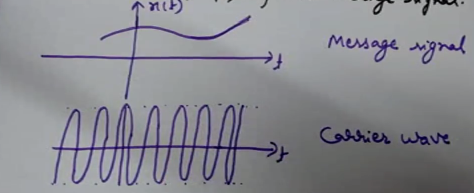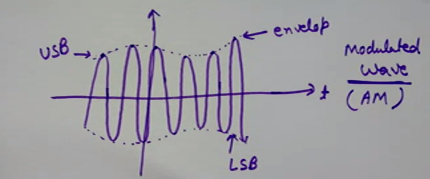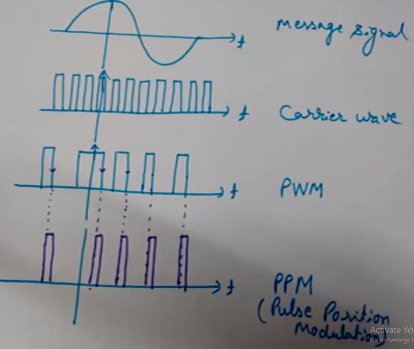Here we will discuss what is modulation and different types of modulation.
So let's first see the definition of modulation and it's classification -
Now we will see the classification of modulation-
Modulation can be classified broadly into two types -
*Continuous wave modulation
*Pulse modulation
The continuous wave modulation can again be classified into two types-
*Amplitude Modulation (AM)
*Angle Modulation
Amplitude Modulation
In amplitude modulation the amplitude of the carrier wave is varied according to the instantaneous value of the modulating (message) signal. Therefore the information is present in the amplitude variations of the carrier wave.
Angle Modulation
It may be defined as the process in which the total phase angle of a carrier wave is varied in accordance with the instantaneous value of the modulating signal.
The Angle modulation is again of two types-
*Frequency Modulation (FM)
*Phase Modulation (PM)
Frequency Modulation
In frequency modulation, the frequency of the carrier wave is varied in accordance with the instantaneous value of the modulating signal.
Phase modulation
In Phase modulation, the phase of the carrier wave is varied according to the instantaneous value of the modulating signal (message signal).
Now let's discuss the pulse modulation
Pulse Modulation
In Pulse modulation some parameter (amplitude, width or position) of the pulsed carrier wave is varied as per the instantaneous value of the modulating signal.
Pulse modulation is of 3 types
*Pulse Amplitude Modulation (PAM)
*Pulse Width Modulation (PWM)/Pulse Duration Modulation (PDM)
*Pulse Position Modulation (PPM)
Pulse Amplitude Modulation
In pulse amplitude modulation, the amplitude of the pulsed carrier wave is varied according to the modulating signal value.
Pulse Width Modulation
In this type of modulation, the width of the pulsed carrier is varied as per the value of the modulating signal
Pulse Position Modulation
In Pulse position modulation, the position of the pulsed carrier is varied as per the value of the modulating signal.
So let's first see the definition of modulation and it's classification -
Definition of Modulation
Modulation is a process by which some characteristic (amplitude/frequency or phase) of a high frequency carrier wave is varied in accordance with the instantaneous value of the message signal (modulating signal).Now we will see the classification of modulation-
Types of Modulation
 |
| Types of Modulation |
Modulation can be classified broadly into two types -
*Continuous wave modulation
*Pulse modulation
Continuous Wave Modulation
In this type of modulation the carrier wave is continuous. Continuous wave modulation is a technique of modulation where some parameter (amplitude, frequency or phase) of a sinusoidal carrier is varied in accordance with the instantaneous value of the modulating signal.Pulse Modulation
In the pulse modulation the carrier wave is in the form of pulses. In Pulse modulation some parameter (amplitude, width or position) of the pulsed carrier wave is varied as per the instantaneous value of the modulating signal.The continuous wave modulation can again be classified into two types-
*Amplitude Modulation (AM)
*Angle Modulation
Amplitude Modulation
 |
| Message Signal and the Carrier Wave |
 |
| Amplitude Modulated Wave (AM Signal) |
In amplitude modulation the amplitude of the carrier wave is varied according to the instantaneous value of the modulating (message) signal. Therefore the information is present in the amplitude variations of the carrier wave.
Angle Modulation
It may be defined as the process in which the total phase angle of a carrier wave is varied in accordance with the instantaneous value of the modulating signal.
The Angle modulation is again of two types-
*Frequency Modulation (FM)
*Phase Modulation (PM)
Frequency Modulation
 |
| Frequency Modulation (FM) |
In frequency modulation, the frequency of the carrier wave is varied in accordance with the instantaneous value of the modulating signal.
Phase modulation
 |
| Phase Modulation (PM) |
In Phase modulation, the phase of the carrier wave is varied according to the instantaneous value of the modulating signal (message signal).
Now let's discuss the pulse modulation
Pulse Modulation
In Pulse modulation some parameter (amplitude, width or position) of the pulsed carrier wave is varied as per the instantaneous value of the modulating signal.
Pulse modulation is of 3 types
*Pulse Amplitude Modulation (PAM)
*Pulse Width Modulation (PWM)/Pulse Duration Modulation (PDM)
*Pulse Position Modulation (PPM)
Pulse Amplitude Modulation
 |
| Pulse Amplitude Modulation (PAM) |
In pulse amplitude modulation, the amplitude of the pulsed carrier wave is varied according to the modulating signal value.
Pulse Width Modulation
 |
| Pulse Width Modulation (PWM)/Pulse Duration Modulation (PDM) |
In this type of modulation, the width of the pulsed carrier is varied as per the value of the modulating signal
Pulse Position Modulation
 |
| Pulse Position Modulation (PPM) |
In Pulse position modulation, the position of the pulsed carrier is varied as per the value of the modulating signal.
